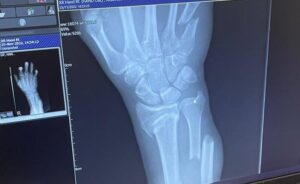World Mental Health Day: “Employers risk losing valued employees if stress is not managed”
Bosses across the whole of Great Britain have been warned that they risk losing valued team members if they fail to manage their workers’ stress levels in the workplace.
The Health and Safety Executive (HSE) is reminding British employers of their legal duties on World Mental Health Day (10 October).
HSE’s Working Minds campaign provides readily-available and free resources for employers to help recognise the signs and tackle the root causes of stress.
Around half of work-related ill health is down to stress, depression or anxiety with each person suffering taking an average of 19.6 days off work.
Kayleigh Roberts, Work-Related Stress Policy Lead at HSE, has urged employers to use World Mental Health Day to take the time to assess whether they are carrying out their legal duties and what they can do to prevent employees suffering from work-related stress.
She said: “We find many businesses focus on the ‘nice to have’ rather than making changes that will have a real impact. That means creating working conditions and an environment that prevents stress and supports good mental health – designing jobs with realistic workloads and targets, and encouraging people to have a healthy work-life balance.
“Prevention is better than cure – employers need to get proactive on reaching out and recognising the signs and causes of stress and bubbling issues in teams before they become problems. If you suspect you already have a problem, tackle it, it can be daunting but it’s important to address the root cause.
“Failing to manage stress at work could lead to reduced productivity, sickness absence, or even losing a valued member of the team. Our Working Minds campaign has all the resources you need to make a change. You can get started in your own workplace, and you can share the resources to help others to thrive.”
Launched in November 2021, Working Minds now has 35 partners, who have joined HSE’s campaign urging workplaces to take action on work-related stress and mental health.
Working Minds helps employers to follow five simple steps based on risk assessment. They are to Reach out and have conversations, Recognise the signs and causes of stress, Respond to any risks you’ve identified, Reflect on actions you’ve agreed and taken, and make it Routine.
There are six main areas that can lead to work-related stress if they are not managed properly. These are: demands, control, support, relationships, role and change. Factors like skills and experience, age, or disability may all affect someone’s ability to cope.
HSE has a free online learning tool for businesses with over 9,000 people already registered with over 90% saying it was easy to use and felt they could implement what they learned in their organisation.
Helpful resources:
- register for our free online learning
- download a risk assessment template
- see the Talking Toolkit for help structuring your conversations
- access resources to share with others
Notes to editors:
- The Health and Safety Executive (HSE) is Britain’s national regulator for workplace health and safety. We are dedicated to protecting people and places, and helping everyone lead safer and healthier lives.
- To read more about HSE’s Working Minds campaign click here
- For press and media enquiries please contact media.enquiries@hse.gov.uk







